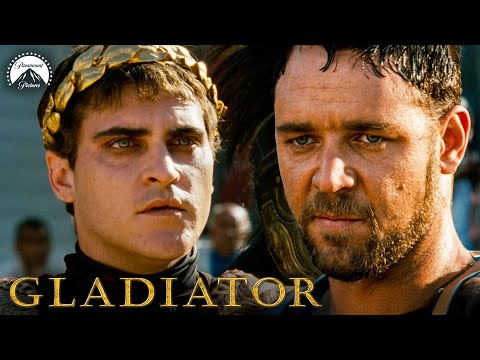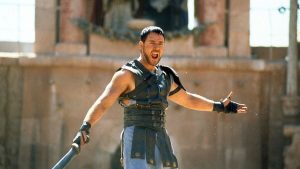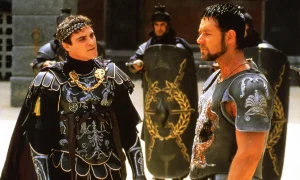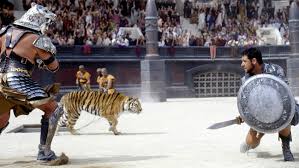Gladiator (2000)
- movieslovers
- January 2, 2025

Gladiator (2000) – Overview and Legacy
Ridley Scott’s Gladiator (2000) is a historical epic that revived the swords-and-sandals genre, captivating audiences with its powerful storytelling, visceral action, and a career-defining performance by Russell Crowe. The film became a cultural phenomenon, earning critical acclaim and multiple Academy Awards, including Best Picture and Best Actor.
1. Plot Summary
Set in the Roman Empire during its height, Gladiator follows the story of Maximus Decimus Meridius (Russell Crowe), a loyal general who is betrayed by the ambitious Commodus (Joaquin Phoenix), the emperor’s corrupt son. After being sentenced to death and seeing his family murdered, Maximus is enslaved and forced to become a gladiator.
As he rises through the ranks of the arena, Maximus gains the support of the Roman people and seeks vengeance against Commodus while striving to restore the honor of Rome. The story builds to a climactic confrontation in the Colosseum.
2. Key Characters
- Maximus Decimus Meridius (Russell Crowe): A once-powerful Roman general turned gladiator who fights for vengeance and justice.
- Commodus (Joaquin Phoenix): The ambitious, cruel son of Emperor Marcus Aurelius who seizes the throne through treachery.
- Lucilla (Connie Nielsen): Commodus’ sister, who opposes her brother’s tyranny and aids Maximus in his quest.
- Proximo (Oliver Reed): A former gladiator who trains Maximus and helps him navigate the brutal world of the arena.
- Marcus Aurelius (Richard Harris): The wise Roman emperor who wishes to restore the republic but is betrayed by his son.
3. Themes
- Revenge and Redemption: Maximus’ journey is driven by his desire for vengeance, but it is also a quest to find peace and restore Rome’s glory.
- Honor and Loyalty: The film explores the concepts of honor, both personal and political, contrasting Maximus’ integrity with Commodus’ corruption.
- Power and Corruption: Through Commodus’ rise to power, the film examines how ambition and moral decay can lead to tyranny.
- The Power of Legacy: Maximus’ actions inspire others to fight for a better future, underscoring the lasting impact of his sacrifice.

4. Visual and Cinematic Style
- Direction: Ridley Scott’s masterful use of sweeping visuals and intimate character moments creates a grand yet emotionally resonant epic.
- Action Sequences: The gladiatorial combat scenes are brutal and visceral, showcasing Scott’s attention to detail and the intensity of ancient Rome’s arenas.
- Cinematography: John Mathieson’s use of dramatic lighting and sweeping landscapes enhances the film’s epic scale.
- Score: Hans Zimmer and Lisa Gerrard’s haunting, powerful score is a defining element of the film, with tracks like “Now We Are Free” becoming iconic.
5. Critical and Commercial Success
- Box Office: The film grossed over $460 million worldwide, becoming one of the highest-grossing films of 2000.
- Awards: Gladiator won 5 Academy Awards, including Best Picture and Best Actor (Russell Crowe). It also received numerous other accolades, cementing its place as a modern classic.
- Cultural Impact: The film’s quotes, such as “Are you not entertained?” and “What we do in life echoes in eternity,” have become part of popular culture.
6. Legacy
- Revival of a Genre: Gladiator revitalized the swords-and-sandals genre, inspiring films like Troy (2004), 300 (2006), and Kingdom of Heaven (2005).
- Influence on Modern Epics: The film’s combination of grand spectacle and emotional depth has influenced subsequent historical dramas.
- Planned Sequel: A sequel, Gladiator 2, is reportedly in development, with Ridley Scott returning to direct. It is expected to follow the story of Lucius, Lucilla’s son, and explore the legacy of Maximus.

7. Memorable Quotes
- Maximus: “My name is Maximus Decimus Meridius, commander of the armies of the north, general of the Felix Legions, loyal servant to the true emperor, Marcus Aurelius. Father to a murdered son, husband to a murdered wife. And I will have my vengeance, in this life or the next.”
- Commodus: “It vexes me. I’m terribly vexed.”
- Proximo: “We mortals are but shadows and dust.”
8. Why It Endures
Gladiator remains a cinematic masterpiece because of its universal themes, memorable characters, and Ridley Scott’s vision. It strikes a balance between spectacle and storytelling, offering thrilling action while exploring profound ideas about honor, legacy, and humanity.
Would you like a deeper dive into specific aspects of the film, such as character analysis, historical accuracy, or insights into the upcoming sequel? 🏛️











